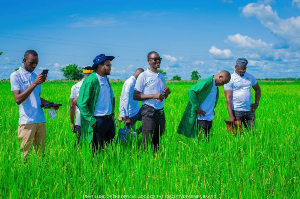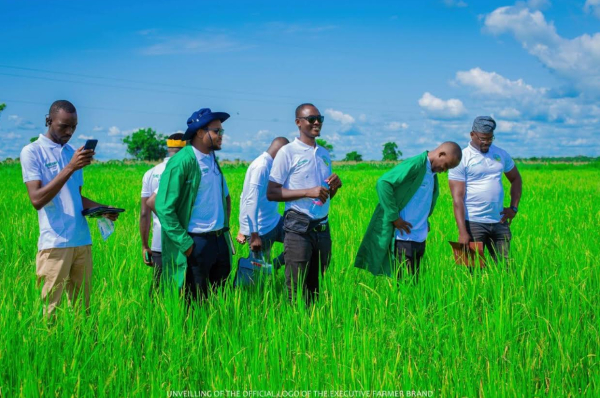 File photo of farmers at a farm
File photo of farmers at a farm
The Feed Ghana initiative
A flagship intervention under the government’s broader agricultural transformation agenda is strategically designed to enhance food security, create jobs, and strengthen the agricultural value chain.
It aligns with Ghana’s Medium-Term Development Framework and the vision for a 24-hour economy, both of which place agriculture at the center of sustainable national development.
However, despite its noble objectives and policy alignment, the program’s implementation at the local level faces a critical, growing obstacle: inadequate funding.
Disconnect Between Policy and Practice
While the central government emphasizes agriculture as a priority sector, District Departments of Agriculture, the actual implementers, are struggling to execute their mandates due to a lack of basic financial support.
This disconnect between policy and resource allocation raises serious concerns about the program’s viability and sustainability.
For example, one of the foundational tasks under Feed Ghana is the registration and digitization of farmer groups using a web-based platform developed by the Ministry of Food and Agriculture (MoFA).
This task is not a mere clerical exercise
It demands considerable fieldwork, mobilization, and coordination. Agricultural Extension Agents (AEAs) must traverse remote farming communities to identify, verify, group, and register farmers.
They are also required to provide training and follow-ups. This work is capital- and labour-intensive, involving transportation costs, data-collection devices, internet connectivity, fuel, and, sometimes, accommodation in hard-to-reach areas. Without adequate logistics and operational budgets, these essential processes stall, and the data quality and coverage suffer.
Systematic Underfunding of District Agriculture
Despite agriculture’s critical role in Ghana’s socio-economic framework, many District Assemblies allocate little or no funding to their Agriculture Departments from the District Assemblies Common Fund (DACF).
In some districts, agriculture has been completely excluded from annual composite budgets. This is not only counterproductive but a fundamental flaw in the decentralization agenda, which was intended to empower local governments to respond effectively to local development priorities, including food production and rural livelihoods.
This chronic underfunding sends a conflicting signal
On the one hand, the government publicly promotes Feed Ghana and rural development; on the other hand, it starves the very institutions tasked with delivering these outcomes.
As one frustrated extension officer put it, “How can we implement a national policy when even fuel for field visits is unavailable?”
Consequences for Food Security and Farmer Confidence
The implications of this funding gap are severe and far-reaching:
– Delayed farmer registration means many farmers are left out of government support programs such as fertilizer subsidies, improved seeds, training, and mechanization services.
– Incomplete data undermines the government’s ability to plan for food supply, market linkages, and emergency responses.
– Demoralized staff in the Agriculture Departments struggle to meet their performance targets, leading to poor supervision and weak extension services.
– Farmer confidence in government programs dwindles, particularly when promises are made but not fulfilled due to administrative bottlenecks.
What Needs to Be Done
If the government is genuinely committed to the Feed Ghana agenda, the following immediate actions must be prioritized:
1. Earmark Dedicated Funds for Agriculture in DACF Allocations.
2. Provide Operational Support for Agricultural Extension Agents.
3. Strengthen Interdepartmental Collaboration.
4. Institutionalize Monitoring and Accountability.
5. Engage Development Partners and NGOs.
Conclusion
Agriculture is not a ceremonial sector. It is the backbone of Ghana’s economy, a source of food, employment, foreign exchange, and national identity. The Feed Ghana program can only succeed when district-level actors closest to farmers are fully empowered through funding, training, and logistical support.
It is time for the government to move beyond rhetoric and deliver real investment at the grassroots. As the World Bank noted in its 2022 Agricultural Financing Report, “Policies without resources are merely wishes.” Ghana’s farmers deserve more than promises. They deserve action, and it starts with funding the departments tasked with feeding the nation.
By:
Musah Seidu
District Agricultural Officer
Atiwa West District Department of Agriculture, Kwabeng, Eastern Region
+2330243465024
